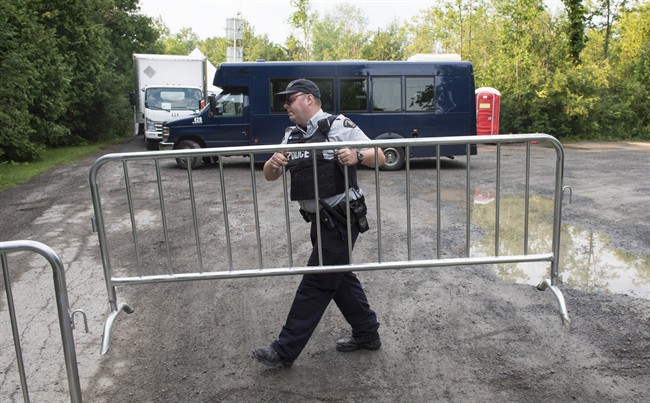“Canada is a very liberal country that believes in freedom of religious practice and equality between men and women. What is your opinion on this subject? How would you feel if your boss were a woman? How do you feel about women who do not wear the Hijab, Dupatta, Chador, Niqab or Burka?”

No, this was not a script for a Kellie Leitch campaign video. It was a query included in a three-page questionnaire given by RCMP officials to people who illegally crossed the Canadian-American border near Lacolle, Que.
Twelve thousand men, women and children have made the trek this year, most of whom have claimed refugee status on Canadian soil. A large number are Haitians, who fear they will be deported back to Haiti due to policy changes contemplated by U.S. President Donald Trump. Many others are claimants from Muslim-majority countries who no longer feel comfortable in America, and would rather apply for refugee status in Canada.
Under our Safe Third Country Agreement with the United States, Canadian officials can only turn these people back if they cross at legal checkpoints, not illegal ones. This has the perverse effect of encouraging illegal crossings at places like Lacolle, where a veritable industry of smugglers and drivers ferries people to the Roxham Road crossing.
To stem this tide, the Canadian government could call on the U.S. to reopen the agreement and eliminate the loophole. But in the middle of NAFTA negotiations, with protectionist currents running at a fever pitch in Washington, there is no appetite for such a conversation. And so, the illegal crossings continue.
Instead, Ottawa’s response has been to throw money at the problem: hiring more border officials, erecting a temporary tent city in Lacolle, setting up cots in Montreal’s Olympic Stadium and building a second shelter in Cornwall, Ont. And the RCMP has been tasked with ensuring the migrants do not present a security risk — a very real possibility when you have thousands of undocumented people simply showing up at your country’s doorstep.
Which is where the infamous questionnaire comes in.
“Due to the high volume of irregular migrants in Quebec,” said RCMP spokesperson Annie Delisle, “an interview guide was developed as an operation tool to streamline processing and provide consistency in the RCMP’s preliminary risk assessments.”
- ‘Shock and disbelief’ after Manitoba school trustee’s Indigenous comments
- Canadian man dies during Texas Ironman event. His widow wants answers as to why
- Several baby products have been recalled by Health Canada. Here’s the list
- ‘Sciatica was gone’: hospital performs robot-assisted spinal surgery in Canadian first
The questionnaire included the aforementioned question about attitudes towards women, as well as other personal questions about religion and prayer habits. It also included a section on affiliation with extremist groups, opinions about terrorist attacks and thoughts on ISIS, and asked respondents, “Do you have any criminal intentions while in Canada?”
Excuse me while I stifle a laugh here. (You’re a criminal — you’re going to answer truthfully?) As for affiliation with or support for extremist groups, it is highly unlikely that anyone who was trying to sneak across the border to commit terrorism would fess up to those either. If anything, they would probably lie very convincingly.
But it’s the questions about religion and values that struck a nerve. These most clearly hone in on Muslims — assuming, for example, that Muslims would have negative attitudes about women. And while it is true that some Muslims believe women to be inferior to men, and discriminate against them on that basis, this is also regrettably true of many other faiths.
Even people of no religious affiliation evince such attitudes: a survey by a group of professional women in 2013 found that 23 per cent of its 1,800 respondents preferred a male boss, while five per cent preferred a woman, and 67 per cent had no preference. Since Muslims comprise only three per cent of the Canadian population, clearly Islam wasn’t the determining factor in those responses.
Following complaints by refugee lawyers, the guide was discontinued. “The minute we became aware of the interview guide,” Scott Bardsley, spokesperson for Public Safety Minister Ralph Goodale, wrote in an email to the Toronto Star, “we were immediately concerned and contacted the RCMP … Some of the questions were inappropriate and inconsistent with government policy.”
That’s a whopping understatement, actually. The questions are inconsistent with respect for the Charter of Rights, which protects freedoms of opinion, speech and religion. They’re also inconsistent with common sense.
If the RCMP really wants to do a threat assessment of someone at the border, there are far more effective ways of determining if someone is a supporter of ISIS or the Taliban, a neo-Nazi or a Ku Klux Klan Grand Wizard — or anyone else who holds extremist views and could threaten our nation’s peace and security. Parse would-be refugees’ social media accounts, and look for potential links to or postings by extremist groups. Collate migrants’ names with criminal databases in both the United States and their country of origin.
That’s more work than just asking someone if he’s a terrorist, doesn’t like women with uncovered heads, or is a Muslim. It’s also a lot more effective.
Tasha Kheiriddin can be heard between noon and 2 p.m. ET on Toronto Talk Radio AM640. She’s also a columnist with Global News and iPolitics.ca, where this piece first appeared.











Comments